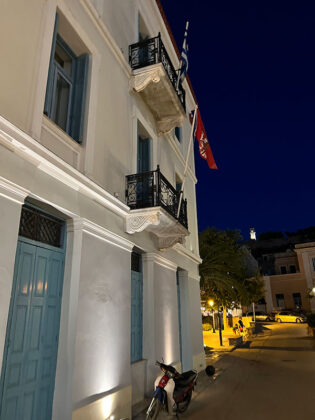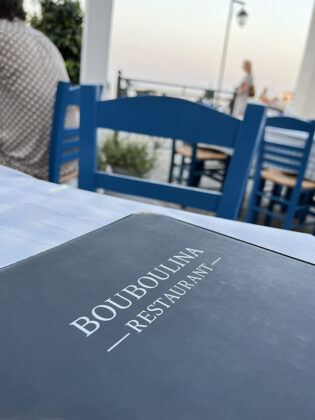The Mistress of Spetses
An excerpt of a historical novel of Laskarina Bouboulina: the nautical leader of the Greek Revolution of 1821
By Nikos Linardakis, M.D.
The Mistress of Spetses is a gripping historical novel, set during the Greek Revolution of 1821, chronicling the adventurous life of Laskarina Bouboulina, who is also a narrator—the fearless sea captain who helped liberate Greece after nearly 400 years of Ottoman rule. Emerging as a symbol of modern Greece, she ended centuries of subjugation and enslavement, and ushered in the rebirth of the Hellenic spirit. Defying societal norms, she amassed wealth through controversial ventures to fund Greece’s fight for independence. She financed, commissioned and ultimately led the colossal warship Agamemnon into critical battles. Known for her stern demeanor and commanding presence, donning full battle regalia, she became the local heroine of Spetses and a symbol of Greek valor.

Author-Dr-Niko-Linardakis – (Photo Credit: Nicholas Cotras)
The Price of Silent Defiance
“One eats, another watches—that’s how revolutions are born.” Malik spoke calmly, yet his words bore weight of a warning. He had seen the shifting winds, sensed the growing unrest on the island. For three months now, tensions had thickened like a storm gathering on a horizon, inevitable and unrelenting.
He was a mültazim, an Ottoman tax collector. His partner, Hasan, scoffed as he adjusted the folds of his robe, “We see lies inked on ledgers every day—merchants who underreport, businesses that refuse to pay their full dues. We enforce what obligations demand. Do not stray from your place as well. The Sublime Porte has no patience for treachery.”
I held Hasan’s gaze without flinching, unyielding, “You know I have always fulfilled my obligations, Hasan.” Then, redirected my attention back to Malik. Unlike Hasan, whose loyalty to the Empire was unquestionable, Malik carried something different in his stance—a whisper of doubt, perhaps understanding, or something deeper he dared not name.

Laskarina Bouboulina 1821 Oil Painting Victor Hofmeister
For nearly a decade, I provided these men with the capital the Ottoman’s demanded. We learned to navigate one another, circling in a delicate dance of necessity and restraint. But now, the floor was beginning to crack beneath us.
Hasan spoke for the elite—the beys, the pashas—the men who dined in gilded halls while the rest starved.
“Yes, perhaps I am among them,” I admitted. “But resentment festers in the village streets. The impoverished will not remain idle forever; sooner or later, they will rise to claim this disparity. There are limits to what men can endure before they decide to take what has been denied. If you wish to avoid an uprising, then keep your demands reasonable.”

Island Coast of Hydra
Malik lowered his voice, as if the walls could listen. “The Ottomans know this, but it is of no concern. The Greeks fill their souls with contempt, yet lack obedience and discipline. They manipulate, making us believe their suffering is exceptional. Such is the nature of a fearful, hostile people. They should remain loyal to the Empire. Peace be with you.”
I inhaled and then responded sharply, unwilling to let his words settle without contest. My patience was thinning. “These invisible manipulators or ‘contemptuous people’ provide the Ottomans with everything they need,” I countered. “Their prostitutes, their weapons, their bountiful harvests! Who feeds your armies? Who stocks your kitchens with wine and grain? Who embroiders your silks? You embellish with all sides, Malik. And so do I.”
I let the words settle before continuing.

Sweet Freedoms in Nafplion
“I speak Greek, Turkish, Arvanitika, French, and more—not because I wish to, but because I must. The mystery, or secret, to survival is not loyalty, but pragmatism. You may have noticed, I never speak of myself. I neither deny nor answer accusations. My silence is my shield. I dampen Greek ambitions just enough to keep the Empire satisfied. But, I warn you—this is a transaction for me. It is not for them. I hold them in check, but only so long as they believe there is still something left to lose.” I took a measured breath, “Mind your demands, Malik, as patience has worn thin after four hundred years. They will not accept this situation forever. I can only hold them to their peace—with peace. As I’ve said, push them further, and they will not respond with submission.”
Malik’s fingers tightened around the porcelain handle of his demitasse. His lips pressed together as he processed my words, then he took a slow sip of sweetened Greek coffee.
“These vagabonds you hold in such esteem?” he finally said. “They are scattered, divided, unorganized. They have no future.”

Nafplion seaside
“They are desperate,” I corrected. “And desperate men do not stay disorganized for long. They will lead as Greeks, and in a direction you will not expect.”
Silence stretched between us. I reclined in my chair and with deliberate calm, scrawled out the month’s tax payment. Then, I handed the grammata script to Malik. He hesitated before taking it, his fingers curling over the parchment’s edge—a man gripping a lifeline. He knew as well as I did: life was becoming unbearable. Merchants bled under relentless taxation, the cost of goods soared beyond reason, and trade was strangled. The local people—merchants, farmers, families—all were breaking, suffocating under the weight of these demands. I had seen the faces of the dockworkers, their hands calloused from loading shipments that barely kept them fed. I watched mothers haggle over moldy bread, their voices tight with quiet panic. This was not sustainable.
I pressed forward, my words deliberate. “Malik, consider Sultan Mahmud and his viziers. They believe themselves as clever, untouchable, but they are blind to the truth—they are our oppressors. They demand even more taxes while they massacre our Greek kin. For centuries, have we not provided without altering course? Yet, the cruelty continues. This path cannot last.”

Nafplion home given when exciled to Spetses
Malik’s expression darkened. “Laskarina, you make compelling points, but you forget yourself. You are our guest, not the other way around. This is the Ottoman Empire. Where is your loyalty?” He straightened his suit coat, aligned the embroidered cuffs, and curled his mustache—masking the thinly veiled warning beneath his words. It was all to exude a forced confidence. I would not let him have the last word.
I tempered my voice, offering him a measured smile. “I understand your position,” my tone restrained, conceding slightly. “But the imperial elites gaze upon their empire and do not see the reality of their people. With each passing year, suffering deepens. Do you think the Greeks have forgotten the past? Do you think they do not hear the whispers of their grandparents—from the mountains, from the villages, from the very homes they now struggle to keep?”

Statue of Ioannis Kapodistrias in Nafplion
“Even Mehmed Halet Efendi, the great statesman of Istanbul, distrusts all of Europe. And what of Russia? The tsar watches closely. He, too, knows another war is inevitable. The Ottomans are still recovering from the conflicts of the Napoleonic Wars, yet they demand more? I understand losses Malik. Even Bayezid, my dear Ottoman friend, perished at Abukir. War is costly. The French invasion of Egypt is a testament to that. And now, the Empire expects us to give more than what God grants.”
In measured defiance, I held his gaze, locked onto Malik’s green-hued eyes. Malik studied me, and for the first time, I saw it—something uncertain—that flicker of hesitation. A divided heritage, perhaps. Part Greek, part Ottoman? It did not matter. In his world, he could only be Ottoman.

Kapodistrias square in Nafplion with Fortress above
Malik countered by reciting an Ottoman proverb, his tone unreadable, “Akilli düsmandan degil; salak dosttan kork.” Be afraid of a stupid friend, not of a smart enemy.
I pushed forward and answered in kind, “Zaman her seyin ilacidir.” Time is the medicine of everything.

Home of Dimitrios Ypsilantis in Nafplion
I saw it in his expression, he believed their strategy would dull the Greeks’ resistance, that they would accept their fate, and continue to pay more. But, I knew better. Time was not their ally; time was the fuel of revolution.
“Beauty fades, but wisdom remains,” Hasan interjected with a smirk.
I added, “We age, but experience never leaves us.”

Laskarina Home night view in Nafplion gone in exile
Malik nodded slightly, his expression curling into insincere graciousness, “Good day, Laskarina, and thank you for your collection. You see, we Ottomans are very understanding. The money you provide is just enough to help our Ottoman citizens—to sustain our land—which of course, we share with the Greeks.” His voice was smooth, but beneath it, there was something rancid, curdling and sour, like the yogurt of his homeland.
He leaned in for the last time, his smile thin. “I can count on you to continue supporting the Ottomans, yes?”
I met his gaze without hesitation and replied, “Of course, Malik. I will do my best to ensure our little village provides all it can.”

Nafplion Fortress Views
With a deliberate calm, I closed my ledger, casting a final glance at the remaining balance. It was more than enough to support the Hellenic cause, and I had abundant resources held in my accounts in Russia, France, and Smyrna.
“Of course,” I echoed. This time, the words were meant only for myself.

Bouboulina Restaurant in Spetses
Hasan rose first, offering a parting nod. “Inshallah. God willing.”
Malik lingered for a fraction longer, the weight of something unspoken pressing between us. Then, with a final empty glance, he turned and stepped out. Together, they disappeared from my home.
It would be the last of our friendship. The end of whatever fragile resemblance of trust we once had.
The war had already begun.

Day view Home Nafplion square
The Klephts’ Revolt: Freedom or Death
On the mainland, Theodoros Kolokotronis and his men gathered their spoils of war—a bounty of weapons, silver akçe, gold sultani kurus, and supplies looted from their latest raid. The aftermath of their attack left a settlement reduced to ashes, its Ottoman defenders sprawled lifeless across the ground. Their silent corpses bore witness to the storm brewing on the horizon, as victims of the rebel’s fury. Word of the klephts—the mountain bandits who had transformed into a revolutionary force—spread quickly.
In Greek, klefti means thief, and in this war, we were all thieves. For centuries, the klephts roamed and retreated into the mountains, waging a relentless resistance against Ottoman rule since the 15th century. They assumed a continuous war for freedom. Klephts survived by stealing livestock, trading goods in the rugged highlands, and ambushing Turkish caravans. But for all their efforts, the klephts had been divided by personal greed and scattered loyalties. Now, for the first time, they would truly unite, bound by a singular purpose, under one banner, and a leader worthy of their cause: Theodoros Kolokotronis had taken command.

Greek dining Bouboulina Restaurant
When they stormed Turkish compounds, Kolokotronis and his clan left no mercy in their wake. Everything was fair game, they took what they needed, bagged metal tools, fine fabrics, leathers, carpets, ammunition, knives, all weapons of war, and any remaining food. When they returned to their base, they buried the valuables in makeshift basements dug beneath the wood and dirt floors of their families’ homes and businesses. Concealing them under silk rugs and wool carpets, and topped those with wooden furniture, to deceive prying Ottoman eyes. They were no longer mere raiders, they were true revolutionaries, financing their quest for freedom.
Once the killings began, Kolokotronis placed a bounty on Turkish heads, and so did I. Each severed head was worth a few gold kurus, and every death was one less enemy to contend with. At one point, in the year during the siege of Tripolitsa, we stacked over two hundred heads behind our camp. The stench was unbearable to some, but not to us. Flies swarmed, but no bees came—there were no flowers among the dead. This did not symbolize decay to us. Instead, it was a promise of rebirth, a future Greece, free from its oppressors. Every fallen enemy was a step toward a free Greece.
Those who hesitated quickly learned—this was a war of necessity. The Ottomans had pursued us for centuries. Now, we were the hunters. War was our marketplace, and the Ottoman blood was our currency.

Nikos Linardakis boating in Spetses
I would soon be fighting with every ounce of strength, every resource at my disposal. They called me Kapetanissa, the Female Captain of the Island. I fought alongside my men, and thus, the name carried deeper meaning. It was not just a title—it was an affirmation. I made decisions. I wielded the sword. I led not through words, but through action. Our mission was clear: either the Ottomans would fall or we would. Since there was no retreat and no compromise, our rallying cry was simple and clear, and it persevered—Victory or Death!
Kolokotronis surveyed his men, his face as sharp as steel. Around him, the klephts ran their fingers over their stolen treasures, weighing their newfound wealth, tasting their first bite of freedom. His voice rose in the night, cutting through the firelit darkness with the authority of a seasoned warrior.

Statue of Laskarina Bouboulina in Spetses harbor
He began, stern and determined, “Never forget why we fight!” His voice boomed. “Our enemy is vile. The Ottomans have raped our women, stolen our children, beheaded and enslaved our brothers!” He paused for emphasis. “They dragged our daughters from our homes and threw our girls into the harems. They sold our sons to the Egyptians and the Arabs! This will not go unavenged.”
By habit, he twisted his mustache, and then, allowed the intensity in his words to settle a bit before continuing.
“My challenge is to keep you motivated—if not by our Greek spirit, by our common goals. If not by patriotism, then let it be for your personal gain. You are no longer peasants. You are warriors! Take your bounty when it is presented. Do not hesitate!”

Sea water of Spetses
The men listened intently, their hardened faces became set with determination. They had seen and lost too much, they had endured enough suffering. Now, they were prepared to kill as many Ottomans as it took to build a new Greece. Though the klephts had long been an erratic brotherhood, loyal only to themselves, in this moment, they stood as one. And, so did I.
I had prepared for this war since birth. I knew my worth, what I had to offer, and where to strike first. I was all in—my reputation, my inheritance, my business resources, and my political ties—I would use them all. There would be no mercy, no retreat, we would fight for freedom, or we would die trying. Freedom or death!
Theodoros Kolokotronis stepped forward once more, his voice charged with purpose. His fierce gaze swept over the band of klephts—men forged by duty and hardened by suffering. They sat in silent anticipation, the weight of their mission pressing upon them. As he spoke, his words became their truth: they would reclaim their homeland.
“Let us reflect on the saints and scriptures, for without faith, all this is foolishness! Father Grigorios gave me these words—‘Beat your plowshares into swords, and your pruning-hooks into spears.’ It is time to prepare. Our tools will no longer serve to till the land, but to spill the blood of those who enslave us. Stop farming and start forging, as the war is upon us!”

Bust of Georgios Androutsos of Spetses
He turned to his comrade, Stamatis, a bold and fearless Souliote—a warrior of formidable strength and agility. Tawny-skinned and powerfully built, he moved with the precision of a predator. His distinctive crushed nose and chiseled jaw bore the scars of countless assaults, each proved his endurance and ferocity. Stamatis was honing the edge of his knife. With a firm grasp, Kolokotronis clasped Stamatis’ hand, their fingers tightening around the dagger’s hilt. In one fluid motion, they lifted the blade together, hand-in-hand, and thrust it towards the heavens. The firelight caught the steel, making it gleam like a guiding star. The gesture was swift, a deliberate and unspoken oath. A roar erupted from the men, their voices rising in thunderous approval as Kolokotronis cemented his command.
He jolted, “Eleftheria i Thanatos! Freedom or Death!”
The kafeneio, a makeshift campsite, erupted in approval.

The Beauty of Spetses
Near Kolokotronis stood Dimitrios Plapoutas, a seasoned fighter who represented the Arcadians, and emerged as a natural leader among us. With purpose, Dimitrios swiftly poured white retsina wine into several glasses, handing them to his comrades, and without hesitation, offered one to me. As the drink flowed, he declared, “Freedom. There is no other option.”
A moment later, Dimitrios raised his glass, and with a firm, unwavering voice, emphasized Kolokotronis’ call for independence, “To the Filiki Etaireia! To the dawn of our eleftheria freedom!”
A voice broke through the gathering—deep, strong, and boisterous.
“Eleftheria i Thanatos! Feedom or Death!”
It was Father Grigorios Dimitrios Dikaios-Flessas—Papaflessas, as we called him. His voice rang out three times, like a sacred chant invoking the power of the Trinity.
“Freedom or Death! Victory or Death! Freedom or Death!”

Bouboulina legacy seen at a restaurant in Spetses
The words spread among us like a holy fire, igniting our very souls. Then, from the shadows, a figure emerged. It was Kyriako, a warrior of Mani, a man of unbreakable will. Kyriako lived a harsh childhood, and had seen his father fight in the 1780 Siege of Kastania. He had met Kolokotronis as a child. Like me, Kyriako had been waiting for this day his entire life. Now, as the owner of the kafeneio where we gathered, he was ready for his next battle.
Stout and tough, he said nothing, but his response to the enthusiasm was unique and one I will always cherish: without a word, he unwrapped a wooden karamouza, a clarinet-like instrument bound in wool. He drew a deep breath and released it into the instrument, playing his response. The sound that emerged was raw and untamed—like a warrior’s call, a challenge, and a solemn promise.
He paused, let out a sharp whistle summoning his comrade over. Kyriako brought forth a daouli drum, its twin sides stretched with fresh goatskin. With a nod, he passed it to his comrade. The first strike echoed into the night—then another, and another. The rhythm took hold, and soon, the courageous men of the revolution stood shoulder-to-shoulder, locked together in a defiant dance of unity. The music swelled, feet pounding the earth in unison, as voices rose in an unrelenting war cry and refrain.
“Freedom or Death! Victory or Death! Freedom or Death!”
The struggle for Greece’s freedom pulsed with rhythm and song, the Hellenic spitha ignited, awakening the spirit of generations past.

Seaside Canon of Spetses
(Excerpted from the novel, The Mistress of Spetses. Copyright ©2025 Nikos Linardakis. All rights reserved)
Dr. Nikos Linardakis serves as President and Co-Founder of The Bêne Baby Company, a goat-milk based infant and toddler formula company headquartered in Nekoosa, Wisconsin. Nikos is a first-generation Greek-American author whose work captures the resilience, courage, and timeless values of his Hellenic heritage. Born in Chicago, IL, he grew up inspired by the strength and leadership of the remarkable Greek women in his life, particularly his mother and aunts. Their vivid stories of bravery and sacrifice during World War II in Greece shaped his appreciation for the unyielding spirit of Greek women.
Dr. Linardakis earned his undergraduate degree from Benedictine University and completed his medical education at the University of Health Sciences/The Chicago Medical School. His own life journey is a testament to perseverance and shaped by grit. After losing his father to colon cancer as a young teenager, he and his three brothers supported their family by performing in a Greek-American band. Meanwhile, their mother, a woman of extraordinary fortitude, guided and pushed them through these challenging times. This upbringing instilled in him a deep appreciation for diligence, faith, and the power of familial bonds.
In addition to his literary pursuits, Dr. Linardakis has an impressive professional background. As Editor-in-Chief, he published eleven medical textbooks with McGraw-Hill Companies and contributed to works by Gibbs-Smith Publishers, Random House Prima Publishing, and Harvard Medical School’s The Natural Standard. His expertise in sleep, nutrition, and health earned him recognition with appearances on CBS, NBC, Fox News, and the Discovery Channel as a trusted health and nutrition professional. His debut novel, The Mistress of Spetses, is a fascinating historical tale that chronicles the life of Laskarina Bouboulina, an indomitable woman and spirited leader who changed the course of Greek history. Currently residing in Nekoosa, Wisconsin, he leads The Bêne Baby Company, creators of the first American-made goat milk-based baby formula. The Mistress of Spetses is his first novel, and marks the beginning of his journey as a novelist.















0 comments